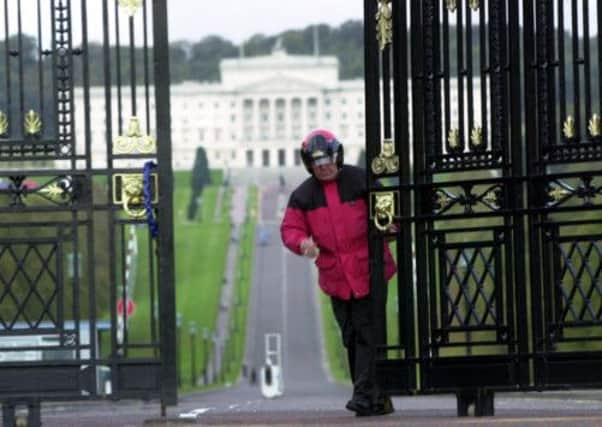Comment: Convergence the new consensus in N Ireland


Politics in Northern Ireland has always had a “parallel universes” quality to it. Elections are two largely separate shows, as unionist parties vie with each other for the votes of the Protestant community while nationalist parties fight it out for Catholic support. Religion and constitutional position are treated as interchangeable in contests at times dubbed “sectarian headcounts”.
But recent evidence suggests these age-old categories could be eroding – and with them the political certainties. Much has been made of the recent census figures in which a new, seemingly shared, national identity emerged. A total of 29 per cent of people in the 2011 census identified themselves as Northern Irish, with 21 per cent defining themselves as Northern Irish only, compared to 40 per cent as British only and 25 per cent as Irish only.
Advertisement
Hide AdAdvertisement
Hide AdPerhaps an even more significant trend to arise from these figures, however, was the potential for a breaking up of the “religion – national identity – political aspiration” triad. A total of 48 per cent of people identified themselves as Protestant while only 40 per cent saw themselves as British. At the same time, 45 per cent identified themselves as Catholic, yet only 25 per cent labelled themselves as Irish. Indeed, recent opinion polls show the percentage of people that favour a united Ireland to be less than 20 per cent and actually indicate that a higher proportion of Catholics now wish Northern Ireland to remain part of the British state than those seeking Irish reunification. Being Catholic can no longer be assumed to go hand-in-hand with being Irish and nationalist, nor is being Protestant an automatic sign of being British and unionist.
What’s more, an increasing proportion of people across the board are rejecting national alignments. In recent surveys, more than 40 per cent consistently identify as neither nationalist nor unionist. Public opinion is a complex thing, but these polls tell a consistent story: that the significance of traditional political positions is waning, while the attitudes and identities of two groups long held to be diametrically opposed converge. So what does all this mean for politics in Northern Ireland? Is this shift translating into a new political configuration? Not yet, appears to be the answer. Nationalist and unionist parties still make up 96 of the 108 seats at Stormont, while parties that try to straddle the divide – the Alliance and the Greens – remain relatively marginal.
But these trends have not gone unnoticed. Unusual noises have been heard coming from nationalist and unionist quarters of late, with the leader of the largest unionist party, the DUP, Peter Robinson, using his annual conference speech last year to declare an aim to reach out to Catholic voters. This move may have had more to do with softening the party’s hard-line image to attract moderate Protestant voters, than any effort to bridge the divide. But now a new force has emerged that appears more serious about that task. The NI21 party, launched last month, has recognised the emerging trends in Northern Irish society – a growing Northern Irish identity, disillusion with “us and them”, “orange versus green” politics and an increasing demographic of pro-Union Catholic voters – and is seeking to tap into them.
Formed by two former members of the Ulster Unionist Party, Basil McCrea and John McCallister, NI21 positions itself as an entirely new force in Northern Irish politics; a party of the 21st Century breaking with the stale patterns of the past. McCrea and McCallister put forward a moderate, right-of-centre policy agenda and pledge to stand on issues rather than identity.
With the slogan “Aspire to Better”, NI21 is positioning itself as a grown-up party, set on tackling the challenges facing Northern Ireland as a whole. Its representatives promise to focus on the issues that matter to people regardless of their religion or national identity – like jobs, schools and healthcare – rather than focusing on symbolic issues like flags and emblems. Not shying away from the constitutional question, they define the party as pragmatically pro-Union – avoiding the “unionist” tag with all its divisive connotations. And the party intends to appeal to voters from both Protestant and Catholic backgrounds.
A fantasy project for a pro-Union party? Not according to its founders. They appear to believe there is a constituency of Catholic voters out there who would not define themselves as unionist but are nevertheless happy with Northern Ireland’s position within the United Kingdom. These people might feel Irish – or Northern Irish, or Irish and British – but at the same time enjoy the benefits of British welfare state institutions like the NHS, or the relative stability of the British economy in recent years compared to its Irish counterpart. They might not wish to wrap themselves in the Union flag or attend an Orange Order parade, but they may support a pragmatic pro-Union party that promotes cultural diversity and bread and butter issues in a new, shared Northern Irish society. This elusive group, though visible in opinion polls, seems to disappear at elections, either staying at home or voting along traditional lines. Whether NI21 can persuade them to make that leap remains to be seen.
Could these developments see a reconfiguration of Northern Ireland politics, where parties begin to stand on policies rather than identity, and campaign across society at elections rather than simply mobilising “their” section of the community? That shift might be a long way off. But the evidence suggests that the “parallel universes” of Northern Irish politics may not be set in stone.
• Cera Murtagh is a PhD Researcher at the University of Edinburgh studying the politics of post-conflict societies.